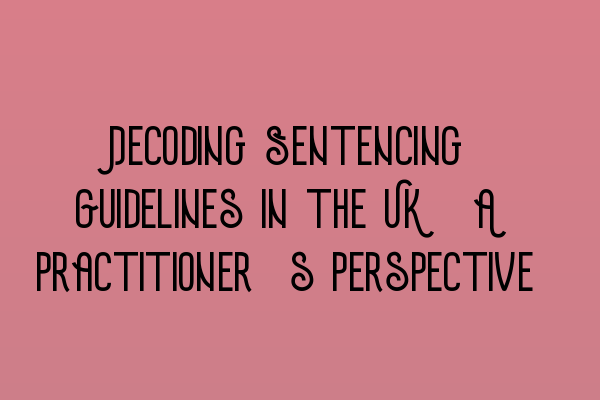Decoding Sentencing Guidelines in the UK: A Practitioner’s Perspective
As a criminal law practitioner in the UK, understanding and effectively interpreting sentencing guidelines is vital. Sentencing guidelines provide a framework for judges and practitioners to determine appropriate sentences for various criminal offenses. However, navigating through these guidelines can often be complex and challenging.
In this article, we will delve into the key aspects of sentencing guidelines in the UK, offering valuable insights from a practitioner’s perspective. Whether you are a budding solicitor or an experienced legal professional, this guide aims to provide clarity on the subject and help you develop a deeper understanding of how sentencing guidelines are applied in practice.
Understanding the Purpose of Sentencing Guidelines
Sentencing guidelines serve as a reference point for judges, ensuring consistency and transparency in sentencing decisions. They aim to achieve fairness and proportionality in determining appropriate sentences for criminal offenses, based on the severity of the offense and individual circumstances.
These guidelines are created by the Sentencing Council in England and Wales, taking into account relevant legislation, court decisions, and public opinion. They are regularly updated to reflect changes in legislation and societal norms.
SQE 1 Practice Mocks FLK1 FLK2
Considerations in Sentencing
When considering an appropriate sentence, judges take into account various factors, such as the nature and severity of the offense, the harm caused to the victim, the culpability of the offender, and any aggravating or mitigating factors.
Aggravating factors can include prior convictions, the use of violence, or premeditation, while mitigating factors may involve an offender’s genuine remorse, cooperation with law enforcement, or mental health issues.
In addition, the offender’s personal circumstances, such as age, previous good character, and vulnerability, are also considered during the sentencing process.
Applying the Sentencing Guidelines
While the sentencing guidelines provide a starting point for determining the appropriate sentence, judges have discretion to deviate from these guidelines if there are exceptional circumstances warranting a departure. This allows for flexibility in sentencing to ensure justice is served in each individual case.
It is crucial for practitioners to be well-versed in the relevant sentencing guidelines, regularly keeping up-to-date with any developments or revisions. Understanding the key principles and elements of the guidelines enables practitioners to effectively represent their clients and make persuasive sentencing submissions.
The Role of Legal Professionals in Sentencing
Legal professionals play a crucial role in the sentencing process. As a solicitor, you have the responsibility to gather and present relevant evidence, provide necessary legal advice to clients, and make persuasive arguments on their behalf during the sentencing hearing.
Having a comprehensive knowledge of the sentencing guidelines allows you to navigate through the complexities of the guidelines, ensuring your clients receive fair and just sentences. By understanding the factors that influence the sentencing decision, you can effectively negotiate with the prosecution and present mitigating factors that may lead to a more favorable outcome for your clients.
Ongoing Professional Development
Continuous professional development is crucial for legal professionals to stay abreast of changes in legislation, court decisions, and sentencing guidelines. By attending relevant training programs and courses, such as the SQE 1 Preparation Courses, we can enhance our knowledge and skills in navigating the complexities of sentencing guidelines.
Moreover, engaging in practice exams and participating in mock quizzes, like the SQE 1 Practice Exam Questions, can help practitioners develop confidence and proficiency in applying the sentencing guidelines in real-world scenarios.
As legal professionals, it is our duty to remain dedicated to lifelong learning and professional development to deliver the highest quality representation for our clients.
In conclusion, decoding sentencing guidelines in the UK is a challenging yet essential skill for all criminal law practitioners. By understanding the purpose, considerations, and application of these guidelines, you can effectively represent your clients and ensure justice is served. Continuous professional development and staying updated with the latest guidelines are vital for success in this field.
For further information, please visit our SQE Criminal Law & Practice Law UK page.
